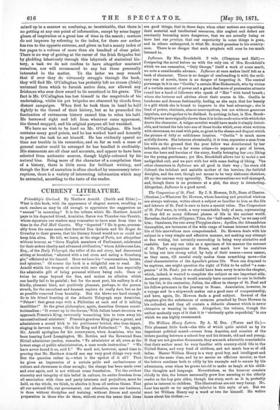CURRENT LITERATURE.
Friendship's Garland. By Matthew Arnold. (Smith and Elder.)— What is this book, with its appearance of elegant sorrow, recalling to such readers as may be old enough to appreciate the suggestion an "annual" in mourning ? It is the tribute which Mr. Matthew Arnold pays to his departed friend, Arminins, Baron von Thunder-ten-Tronkh, whose signature our readers may remember to have seen from time to time in the Pall Mall Gazette. Why "departed" ? He is gone, presum- ably from the same cause that hurried Don Quixote and Sir Roger de Coverley to their graves, that his literary friend would not or could not keep him alive. He fell, we learn, at the siege of Paris, not altogether -without honour, as "three English members of Parliament, celebrated for their ardent charity and advanced civilization," whom Adolescens Leo, Esq., of the Daily Telegraph, the teller of the sad story, had discovered Bitting at breakfast, "adorned with a red cross and eating a Strasburg pie," officiated at his funeral. Here we have his "conversations, letters, and opinions." Of course the book is a delightful one to read. Mr. Arnold wields his weapon of satire with rare skill, and has especially the admirable gift of being personal without being rude. Once or twice he steps beyond the line, and makes an allusion which can hardly fail to be painful ; but for the most part, his raillery is of a kindly, pleasant kind, not positively pleasant, perhaps, to the person struck, for the smoothest and keenest rapiers do really hurt, but as far as possible removed from brutality. But the blows are hard enough. So to his friend boasting of the Atlantic Telegraph says Arminins, "Pshaw ! that great rope with a Philistine at each end of it talking inutilities !" So the great philosopher, again, describes German consti- tutionalism: "It comes up to the throne,' With fullest heart-devotion we approach Prussia's King, reverently beseeching him to turn away his unconstitutional ministers.' Prussia's gracious King gives a grunt, and administers a sound kick to his petitioners' behind, who then depart, singing in fervent tones, 'Hoch for King and Fatherland.' " So, again, Mr. Arnold apologizes for his countrymen, when Arminins, who has been hearing Lord Lnmpington, Mr. Bottles, and the Reverend Esau Hittall administer justice, remarks, "To administer at all, even at the lowest stage of public administration, a man needs instruction." "We have never found it so, said I." We need not, however, spend time in proving that Mr. Matthew Arnold can say very good things very well. But the question rather is,—what is the upshot of it all ? That he gives an impression of a certain pride and exclusiveness of culture and cleverness is clear enough; the charge has been made over and over again, and is not without some foundation. Yet the evident sincerity and integrity of this belief in culture, its entire freedom from all association with class and party interests and prejudices, must be held, on the whole, we think, to absolve it from all serious blame. That all our national life, our government, our education, even our business, is done without discipline and training, without fitness and special preparation in those who do them, without even the sense that these are good things, that in these days, when other nations are organizing their material and intellectual resources, this neglect and defect are constantly becoming more dangerous, that we are actually losing os have lost our prestige, that our superiority in some things is gone, and in others endangered, is what Mr. Arnold preaches to his country- men. There is no danger that such prophets will ever be too much. listened to.


































 Previous page
Previous page